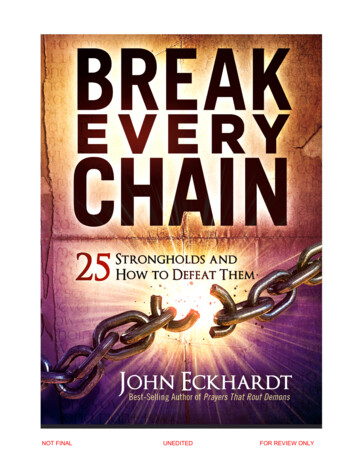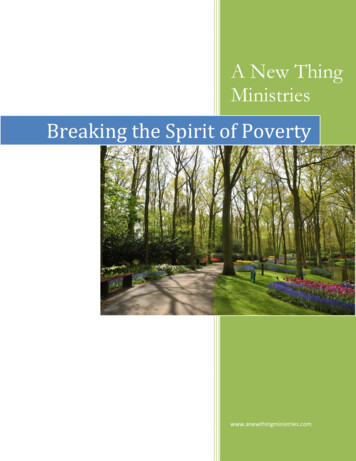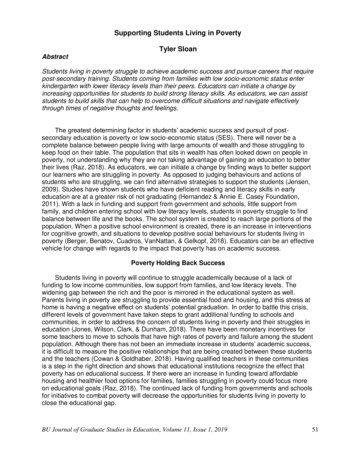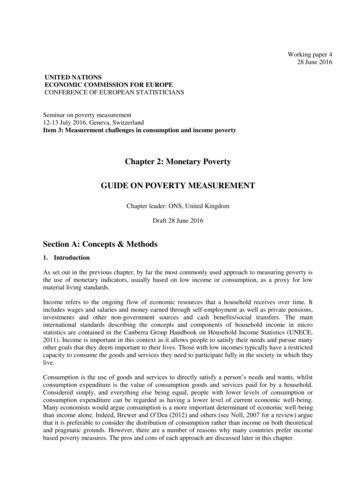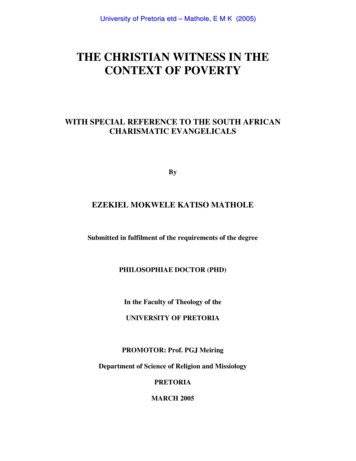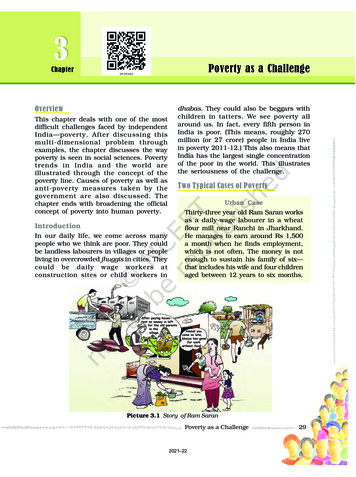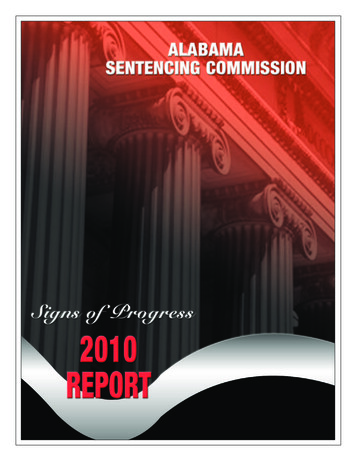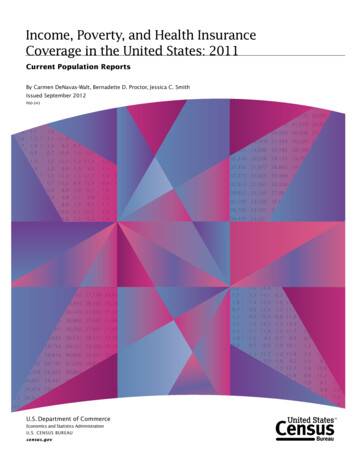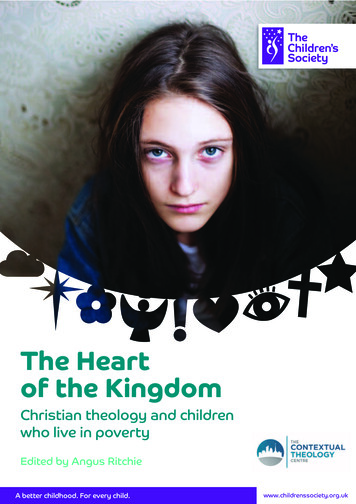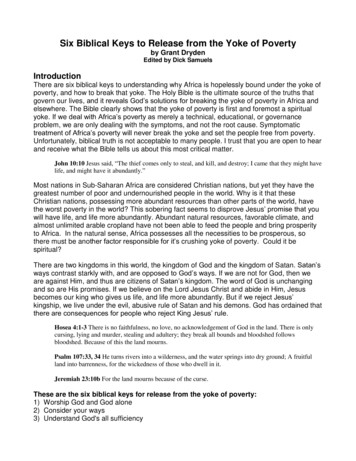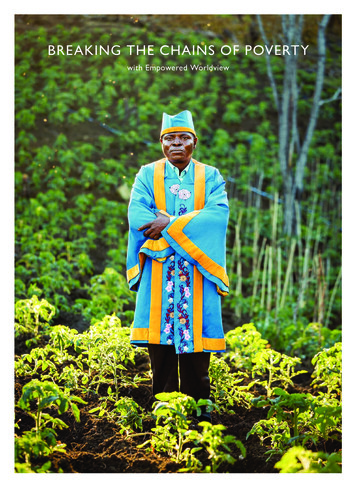
Transcription
BREAKING THE CHAINS OF POVERTYwith Empowered Worldview
Breaking the Chains of PovertyWITH EMPOWERED WORLDVIEW
CONTENTS04PREFACE06INTRODUCTION08THE STORIES66THE EMPOWERED WORLDVIEW APPROACH70PARTNERING WITH FAITH LEADERS72ABOUT WORLD VISIONBreaking the Chains of PovertyWITH EMPOWERED WORLDVIEWBREAKING THE CHAINS OF POVERTY 4WITH EMPOWERED WORLDVIEW 5
PREFACEIn rural Africa, resilient livelihoods require a critical mass of smallholder farmers to fully embrace,own and perpetuate new technologies and improvedfarming practices. Without a critical mass, these technologies create dependencies on the external agentsthat brought the technology in the first place, or theysimply remain as a decaying white elephant whenthe funding and the project have come to an end.While improved technology is easy to introduce toa community, it is impossible to sustain its use in theabsence of profound social change.In our experience in Tanzania, and increasingly inmany other African countries, an empowered worldview has proven to be foundational to support thechange process. It unleashes the creative freedom,strength of character and individual responsibilityof smallholder farmers. It moves them from asubsistence and dependency mindset towardself-confidence in their ability to make a positivechange in the world around them. It equips themwith a mindset of “farming as a business,” makingthem capable of entrepreneurial wealth creationand constructive engagement with governmentstructures for improved delivery of social services.Exposure to improved technologies and agricultural practices can gain the attention and interestof communities, but a mindset shift that leads community members to insist upon adaptation of newtechnologies normally acts as a far more compellingpull factor for sustainably establishing new technolo-BREAKING THE CHAINS OF POVERTY 6gies. Socially empowered communities are best positioned to absorb leap-frogging technology in mobilephone access to financial services, healthcare information, weather forecasts and market information.They benefit more from technical packages consisting of irrigation systems, natural resource management, soil and water conservation, access to credit,input supplies, production contracts, and post-harvest storage and premium prices.As they become economically empowered, theyinsist on improved social services for their childrenand community. They have the means to pay forschool fees, healthcare, and better nutrition for theirchildren—providing well for their families. Theirempowered worldview is the foundation for so-cial, economic and environmental drivers necessaryto achieve the sustainable ongoing development oftheir families and community. Thus the EmpoweredWorldview approach becomes a critical foundationfor realizing the sustainable development goals, as itmobilizes the much needed social and spiritual capital essential for sustainable change in any communityand nation.Tim AndrewsNational DirectorWorld Vision TanzaniaWITH EMPOWERED WORLDVIEW 7
INTRODUCTION“The approaches to development that I have used for years are very good, but after working withEmpowered Worldview I feel they’re missing something: unlocking people’s spiritual poverty. It’s like theyhave a car, but they are missing the key, so they can’t start the engine. That key is in the Word of God.”—ALICE YUGI, WORLD VISION KENYAThe World Bank and UNICEF report that 767 million people continue to live in extreme poverty.And although great strides have been made in recentyears, between 320 and 443 million people continueto live in chronic poverty, transmitting their situationto their children, who spend their lives without thehope that life could ever be better.Incremental change is not enough to solve theproblem of poverty. Transformative, exponentialchange requires unlocking an individual’s potential tobe part of the solution. And that potential can’t berealized unless each person sees the world as a placewhere they are valued and capable.Community development often ignores the vitalrole that faith plays in people’s lives and how theyview the world. Globally, more than eight out of 10people claim a connection with a specific religiousbelief, so ignoring this element of people’s lives meanswe are missing a vital key to effective development.Empowered Worldview fills this gap through anapproach that is faith based and reaches deep intopeople’s core beliefs, transforming their view of theworld so that the cycle of chronic poverty and hopelessness can be broken. Empowered Worldviewhelps people find value in their own identity, create avision for their future and nurture family and community relationships while demonstrating compassion. Aricher understanding of their faith changes how theysee the world and their ability to have an influence ontheir own circumstances.Empowered Worldview is the foundation forWorld Vision’s livelihoods program, THRIVE (Transforming Household Resilience in Vulnerable Environments), which equips farmers to improve theirincomes by learning improved agricultural andmarketing techniques. This combination of mindsetchange and practical capacity-building has demonstrated its effectiveness on improving family incomesand improving child well-being. TANGO International’s midterm evaluation of the THRIVE projectin Tanzania, which includes Empowered Worldview,identified an average monthly increase of 44.36 inhousehold income and a significant and positive project impact in a household’s ability to provide for children’s needs, especially education and food security.Complementing the quantitative midterm review,this book represents a collection of real-life successstories from individuals who have experienced transformation through Empowered Worldview, and notonly have seen a change in their own lives, but also inthe lives of their children, families and communities.In these pages, you’ll meet: Merina Phiri, who broke the power that she feltwitchcraft had over her choices Tony Okoth, whose dreams of being a teacherwere realized when he became a successful farmerand began to teach others how to change theirown worldview Hamad Mussa, who learned to see himself as acommunity change-maker rather than an inexperienced person who couldn’t “do big things” Four Christian and Muslim leaders, who learnedthat they could work together in peace for thegood of their community’s childrenPeople’s faith beliefs govern their lives and worldview. Faith-based programming can transform theheart, creating the exponential change needed tobreak the chains of extreme poverty.Margaret SchulerSenior Vice President, International ProgramsWorld Vision U.S.BREAKING THE CHAINS OF POVERTY 8
“My vision is to empower people for the well-being of the children.”—PASTOR TOBIAS ONYANGOBREAKING THE CHAINS OF POVERTY 10
PASTOR TOBIAS ONYANGO“I understood that God has empowered me to empower others, especially thosewho live in a society like this where vulnerability and dependency are high.I could empower them because I was one of them.”When people visit my farm, this is the first placeI bring them. I say, “See this garden? This iswhere we were.” It’s what, about 7 x 15 meters?The planting is random. There are lots of weeds andthere’s not enough growing to support one person,much less a family. I call this “inadequacy realized.”Of course, I had more land, but I wasn’t doing anything with it because, being a pastor, I only knew thatyou do this old style of planting and then you dependon the congregation to support you. Or maybe yousee a white man and you say, “Hey, can you comeand support us?” That was the language: “Somebodywill come from somewhere” and help us put up thechurch, “somebody will come from somewhere” andsupport us in the ministry, “somebody will come fromsomewhere” with materials for the Sunday school.Plus, being a pastor I wasn’t supposed to be working on a farm or doing a job. I needed to be “holierthan thou.” I don’t know if you understand that concept, but it’s the idea that our place is here in thechurch. That is what the congregation expects. Wedon’t have possessions. We don’t have money. Wehave God. So that small garden I was doing was reallyjust a formality anyway. For the most part, my familyand I were eating what the congregation provided—and that wasn’t much, because they were poor, too.My wife and I and our five children were living on lessthan a dollar a day.The Empowered Worldview training transformedmy mindset. I came to realize that the God that blesses “somebody from somewhere” is the same Godthat blesses people over here. In other words, wecan depend on the Almighty and He can bless us andbring us all that we need, but only if we put ourselvesin a position where He can do that.It starts with understanding your identity—whoyou are and what God created you to do. In thetraining I came to realize that, first and foremost, Iam a child of God, created in His image for good.And second, that I am here to be a steward and to beproductive. So I came to know who I am.And out of that change in mindset came the vision:I understood that God has empowered me to empower others, especially those who live in a societylike this where vulnerability and dependency are high.I could empower them because I was one of them.Only days before I had believed “somebody fromsomewhere” would come and help me, that churchpeople are poor people and that God would save meby sending an angel. And children—including my ownchildren—were suffering as a result.As I walked out the door of the training, I had a vision in my mind and an action plan in my hand. I wouldempower people for the well-being of the children,and I would start with my own family. How? Throughusing the resources I already had. In the training, Ilearned that our land has great potential. It is a giftfrom God that, in time, can transform our lives.So I came back and started farming. I have graduated to a new kind of farming, as you can see. It’sbeing done in an organized way, the quantity hasincreased and I have planted crops designed to supplyproper nutrition for the whole family, especially thechildren. There are cowpeas. They provide proteinand vitamins. Kale provides vitamin A. There aretomatoes, cabbages and a variety of local vegetablesthat have medicinal purposes. And back behindthe greenhouse I am growing sorghum. So youhave the components of good health right here.It’s manageable, it doesn’t cost much and it doesn’trequire as much work as you might think—I still haveplenty of time left over to do the work of the ministry.So far I have managed to transform my family. There is no more malnutrition. Now we growBREAKING THE CHAINS OF POVERTY 12enough that we have some left over to sell and someto share with the neighbors. But this is just the beginning. Now I am moving on to the second part ofmy action plan: the transformation of my church andmy community.Seeing what I’ve done, some of my neighbors havestarted to do the same. They have witnessed thechange, so it’s easy to convince them. But I can’t showeverybody in this region. That’s why I need to includeothers, especially other pastors, because as the proverb says, “If you walk alone you can walk fast, but ifyou walk with others, you will walk far.” I need themto buy into the vision, to help me make it clearer andto help others to see it.So I am starting to invite other pastors to comehere to see what I am doing. Some have embracedthe vision. They are starting to provide for their ownfamilies and to share what they are learning with theirpeople. That is how the change will come.Of course there will still be resistance, but whenI meet it I can’t say, “Now I need to sit down.” No.I meet it with a compassionate heart. I give peopleseedlings that can be easily managed and I say, “Yougo and try, brother.” Then I visit them. I follow up.And I tell them, “Now you’ve seen that this can supply something for your family. Go and increase it sothat it can supply something more.” Transformationtakes time.These days I am so focused on my vision that I don’teven see what is here in front of me. I see a place thatGod has helped me to make into something peopleimmediately recognize as a different environment.A place that supports not just my family or mycongregation or my community, but the Body ofChrist in Africa. I pray that this approach enters intoeach and every believer’s heart, and that one day wewill send missionaries to countries like Cambodiaand Sierra Leone, and even to Sweden and theUnited States, so that they can see how what wasplanted here has grown.Tobias Onyango is the Pastor at Worldwide GospelRevival Church, located near his home in Ragen WestVillage, Nyakach Subcounty, Kisumu County, Kenya.WITH EMPOWERED WORLDVIEW 13
LOREEN TEMBO“Throughout the training we referred to our Bibles. That had a big impact on me.It made me believe that what was being said was true.”The part of the Empowered Worldview trainingthat stuck with me the most was when they toldus, “Even if you are poor now, you can be rich. Youmay be sleeping on a mat on the floor today, but youcan sleep on a bed tomorrow.”Throughout the training we referred to our Bibles.That had a big impact on me. It made me believethat what was being said was true. So I started thinking around the idea that I should not die poor, that Ishould put the word of God into practice.What I learned there is bearing fruit in my life. I aminvolved in a number of income-generating activities.I have been keeping bees since 2006, and also bakingfritters to sell in the market and at school. But beforethe training, I had no proper plan for my money. I wasjust using it to eat, and if I saw something I wanted,I would buy it. But I had nothing to show for it. Iwas not putting my money to productive use and mybusinesses were not growing.After the training, my mindset changed. I startedplanning. I started making better decisions and investing what I earned in buying assets and supporting mybusinesses. I bought more flour so I could make andsell more fritters. With what I earned, I bought a goatBREAKING THE CHAINS OF POVERTY 14and some chickens. Then I took some money frommy savings group (page 68) and bought another pieceof land for cultivation. And when the honey seasonwas good, I had another thought: why not put themoney I earned into buying a piece of land in Mzuzucity, where I could build a house and rent it out?The training also pushed us to reach out and encourage others with what we had learned. Beforethe training, I was teaching and supervising 20 peoplefrom my area in beekeeping. Now I have 100 peoplelearning from me.It’s a good business. It provides a good profit without having to invest much in the way of time, effortor resources—which leaves people free to take upother income-generating activities.Lately, I’ve started thinking about my next move.My idea is to set up a tuck shop (grocery), and then Ican channel all of these smaller businesses into that—honey, chickens, goats, fritters, and more.I’m not rich, but I am now sleeping in a bed. And Iam working hard. I feel like I’m on my way.Loreen Tembo lives in Yadagha Village, Timbiri Traditional Authority, Nkhata Bay District, Malawi.WITH EMPOWERED WORLDVIEW 15
TONY OKOTH“I thought, If I am a tool of God, what can I do? I have a responsibility. I come from a community.What can I give back to that community? What can I do that will change our lives?”Itrained as a teacher, but after I graduated I had ahard time finding a job, so I lived at home, helpingmy dad take care of our farm and our animals. That’swhat I was doing when World Vision called me toattend the Empowered Worldview training. I wasonly a subsistence farmer, but I guess they saw in mesomebody who was at least trying to do better andopen to change.At the training I learned about modern farmingtechnologies and improved breeds. I was told, “Youare created in God’s image and likeness.” And that isa very big privilege. So when I left I said, “God can’tcreate me in His own image and likeness and expectme to be poor. If I am now a tool of God, what can Ido? I have a responsibility. I come from a community.What can I give back to that community? What can Ido that will change our lives?”When I came back, I started noticing all the youngpeople who were sitting around doing nothing all day.Many relied on handouts from politicians. Otherstook up bad habits like drug abuse. Still others hadstruggled to complete their education but in the endthey didn’t have a job.Food shortages are a major challenge in this areaand old people were being left to fend for themselveswhen their children moved away. I wanted to tell theyoung people, “Can we stop this? Let’s work togetherand do something that can change our lives. Let’s dosome farming.”But of course, nobody was going to hear that message, so I decided to form a youth group. I startedsmall with some rabbits I had at home. I slaughteredone and called some young people to get togetherfor a meal. They said, “This is delicious! I’d like to havetwo,” or “I’d like to have three.” So I started givingpeople rabbits and teaching them how to take careof them.Eventually, when they had more rabbits than theycould consume, the group members came and askedme, “Where can we sell the offspring?” I brought in afew friends from other places, and marketing startedlike that. When we had identified a market I told thegroup, “Why don’t we get together and form a groupof rabbit farmers so we can sell at a better price?”Soon we had a group of young people and theyhad some money in their pockets. I said, “Why stopat rabbits? Let’s explore other opportunities.” Sosome of us started doing a similar thing with dairygoats. And then we decided to farm kale. Now wehave moved into improved poultry, dairy cows andpigs as well.It started with just nine people doing rabbit farming. But in the last year, through the farm and youthgroup, we have directly touched the lives of morethan 300 people and our number just keeps growingbecause now people can see that I wasn’t just talking.This thing works. The young people are no longeridle. They’re employed and engaged. They’re standing on their own two feet, taking care of their familiesand passing on what they’ve learned to others.This farm is now a model farm where I train people and show them how to do this work. Our kalefarm has grown to five acres where we also growspinach and tomatoes. Fresh produce used to betrucked into this area from far away. Now schoolsare buying it from us, and we deliver it on the backsof our four new motorcycles.What I love most is when I bring somebody who ispoverty-stricken to our farm. I can show him wherehe’s starting and where he’s going. It feels so good toreach out to people to support them and strive forthem and enlighten them—to watch them transformtheir lives.I may not be working in a classroom, but I guessyou could say I ended up being a teacher after all.Tony Okoth is the founder of Nyolo Nyambaja farmand the Nyambaja Farmers Youth Group. He livesand works in Oyamo Village, Nyakach Subcounty,Kisumu County, Kenya.BREAKING THE CHAINS OF POVERTY 16WITH EMPOWERED WORLDVIEW 17
RACHEL JOSEPH“The most important shift for all of us is in our mindset.We have moved away from the old, which is ignorance, to embracenew ideas, new technologies, new practices and new ways of doing things.”The training made me realize that, apart from thelittle bit of subsistence farming we did, our familywas entirely dependent on my husband and his salary,and we needed to change that. But instead of thinkingcarefully about what we were doing, we were doingthings the same way we had always done them, whichwas the same way our parents had always done them.We had the resources we needed to change our lives,but we didn’t see the opportunities.After the training we worked to turn an emptypiece of land into a banana plantation. The next stopwas poultry keeping. Then we started fish farming.BREAKING THE CHAINS OF POVERTY 18A few months ago my husband was forced to retirefrom his job, and that’s fine. We no longer need hissalary. We have a better income from our farm. Ourdiet has improved, and we have no problem payingour children’s school fees. But the most importantshift for all of us is in our mindset. We have movedaway from the old, which is ignorance, to embracenew ideas, new technologies, new practices and newways of doing things.Rachel Joseph and family live in Kikuletwa Village,Arumeru District, Arusha Region, Tanzania.WITH EMPOWERED WORLDVIEW 19
THE PEACEMAKERS“Empowered Worldview made me realize that regardless of the differencesin affiliation, we are similar; that regardless of the differences in our beliefswe can work together for the development of the whole community.”SHEIKH DINI RASHIDI KIMWERI Previously therelationship between Christians and Muslims in thiscommunity was difficult. There was no way we couldsit here together like this. The people on each sidewanted to say, “I’m better than you.” And when weheard the other side talking, we would say, “They’retalking foolishness.” Now we know we were blind.I must admit it felt a little strange being invited toattend a training by a Christian organization. But Iknow that when God calls, you cannot refuse.As I sat down at the Empowered Worldview training I remembered the Quran, where it talks aboutangels who received knowledge from God, and Ithought I should take this as my example. I shouldstay and learn something, because if God is offeringknowledge, we should receive it.As the training went on, I realized that it was agood thing. It was not changing my faith in any way, itwas just washing away the bad knowledge and wronginterpretations I had.The four of us were together at the training, andafter we came back, we continued talking togetherand eating together. The people in our communitywondered what was going on. It was something new.RAMADANI JUMANNE HUSSAIN After the training,the Muslim leaders called the leaders of the otherfaiths and we sat down to discuss the Quran and itsteachings. We talked about how best to take whatwe had learned to the people.Then the Christians invited everyone and we discussed the Bible and the Christian teachings. Together we came to a consensus about how we could takethe whole community forward using these books.Knowing what was in each and how it was beinginterpreted allowed us to lead the community fromboth sides.PASTOR ISRAEL ELIAMIN People look to faith lead-ers to show them how to live. We are playing therole of peacemakers. Now if there is a Christian gathering or ceremony, the Sheikh might come to it, too.Or I might attend his gatherings. And each of us willwelcome the other publicly and invite him to standup and introduce himself and say something to thepeople. So now we have peace.SHEIKH DINI RASHIDI KIMWERI And, while weare there, if either of us hears something being saidabout our faith that is incorrect, we can go back tothe other person and correct their understanding.Before that would have been a big deal, but now wereconcile and life goes on.In fact, this training has taken us to the point whereI am now an ambassador for the Christians to theMuslim community. I tell my people that Christiansare good, that we can sit together and eat togetherand take part in ceremonies together. And now thisis what is happening in our community.EVANGELIST SAID SALUM KUGA The trainingmade us realize that regardless of the differences inaffiliation, we are similar; that regardless of the differences in our beliefs we can work together for thedevelopment of the whole community.Clockwise from top left: Sheikh Dini Rashidi Kimweri,Pastor Israel Eliamin, Ramadani Jumanne Hussainand Evangelist Said Salum Kuga. All four live in SameDistrict, Kilimanjaro Region, Tanzania.BREAKING THE CHAINS OF POVERTY 20WITH EMPOWERED WORLDVIEW 21
BREAKING THE CHAINS OF POVERTY 22WITH EMPOWERED WORLDVIEW 23
SHEIKH DINI RASHIDI KIMWERI“At the Empowered Worldview training I learned that a person can empower himself—that a change on the inside becomes a change on the outside.”There was a time not so long ago when it seemedlike love had left our home. I was always speaking harshly with my family, and when I left the house,I didn’t even bother to tell anyone I was going. I justleft. The pressure was just too much. My wife neededthings, my children needed money for school and Icouldn’t provide what was needed, so there was nopeace. Poverty drove us away from each other.At the Empowered Worldview training I learnedthat a person can empower himself—that a changeon the inside becomes a change on the outside.I am a religious leader, but I am also a farmer. Foryears I had been growing rice and maize on half anacre of land that I prepared with a hand hoe. It tooka lot of time and effort, and without any fertilizer orsystematic planting methods, the yield was only threeto four bags of rice, which I now know is so low. Then,I would sell the rice without any sort of plan, until Iwould realize, “Oh, we don’t have any more rice leftto eat.”At the training I learned that it was my mindset thatwas poor. We talked about the resources that areall around us—the expertise, fertilizer, tractors, im-BREAKING THE CHAINS OF POVERTY 24proved seed, as well as information on modern planting methods and the possibility of taking out smallloans from microcredit institutions that would allowus to purchase what we needed. I hadn’t been usingany of them. I was just doing things the same way Ihad always done them.So when I came home from the training I took atotally different approach. Now I am cultivating ricethree times a year and I get 20 to 25 bags from thatsame half acre of land. This season I decided to addanother half acre, which means we will end up with40 to 50 bags of rice.I have started saving food for the future, which issomething I’ve never done before. It feels so good toknow we will no longer have to go hungry at certaintimes of the year. I also have plenty of rice to sell, somy children’s school fees are paid and my wife has everything she needs. Life has come back to our home.Love is there.Sheikh Dini Rashidi Kimweri is the leader of threemosques situated in and around his home in MpiraniVillage, Same District, Kilimanjaro Region, Tanzania.WITH EMPOWERED WORLDVIEW 25
PASTOR ISRAEL ELIAMIN MHANDO“When I saw the changes I could achieve in my own life, I took what I had learnedto my congregation, and people started to become entrepreneurs.”Iused to think that, because I am a pastor, it waswrong to seek an income beyond what I receivedfrom my congregation. I thought, “I will find the goodlife when I get to heaven.” Because of that mindset,my family and I were so poor.In the Empowered Worldview training I recognized it when we read Isaiah 1:19. It says, “If you arewilling and obey, you will eat the good of the land.”Of course, I had read that many times, but as we discussed it I thought, “Where are those goods of theearth found? They are actually found here on earth.Why am I struggling to get a good life in heaven whileI have been promised to get it here on earth?” I always look to the Bible for direction in how to livemy life, so why am I ignoring what it says? I must livethis word.Before I was a pastor, I was a cobbler. I saw it as ashameful thing to mend shoes.But after the training, I thought, “No, I must goback and do that. I will get a simple loan with little orno interest to buy the things I need, and I will becomea cobbler again.”As a result of that decision, everything has changed.People brought me a lot of shoes to mend, so nowwe can save money, we can eat good meals. My appearance has even changed, because now I can affordto buy decent clothes.When I saw the changes I could achieve in my ownlife, I took what I had learned to my congregation,and people started to become entrepreneurs. WhenI changed, they also changed. They started to earnmore income. That income is helping them and it isalso flowing back into the church, so the church hasimproved.Before people in this community wanted a pastorwho would lead in church and only in church. Whenthey saw him doing other activities they would runfrom that church. But nowadays, they are runningfrom the churches where the pastor is not engagedin other activities.Israel Eliamin Mhando is the Pastor at Moore Pentecostal Church. He lives in Mpirani Village, SameDistrict, Kilimanjaro Region, Tanzania.BREAKING THE CHAINS OF POVERTY 26WITH EMPOWERED WORLDVIEW 27
MERINA PHIRI“I had never read the Bible before, but I was convinced—not because the facilitatorwas saying it, but because we could read for ourselves the written word of God.”My mother had a lot of money, but she died living in a broken mud-and-thatch house. And itwasn’t because she was happy in that house. It wasbecause she was afraid of witchcraft.There’s a belief around here that if you have goodthings—a brick house, iron sheets for your roof, electricity, nice furniture—others may bewitch you. Soeven if you have money, you don’t attract people’sattention by showing your wealth. You hide it.Because of that belief, I was in trouble. My husbandhad passed away in 1992 and I was raising my children alone. Like my mother, I was living in a mud-andthatch house, but unlike her, I didn’t have any wealthto hide. World Vision had helped me over the years. Itook part in various income-generating groups, I wasin a savings group (page 68), and I was farming—butonly for food. I thought I would die living like this.I thought it was sufficient—after all, everybody elsewas living the same way.But then I attended the Empowered Worldviewtraining. Each of the participants was given a Bible.The facilitators would open to a particular verse andask us to open our Bibles to that verse so we couldsee with our own eyes what it said there. Then theywould explain the points they wanted us to understand and invite us to ask questions.The facilitators pointed out that
breaking the chains of poverty 12 with empowered worldview 13 “I understood that God has empowered me to empower others, especially those who live in a socie
